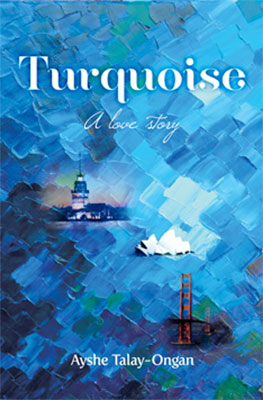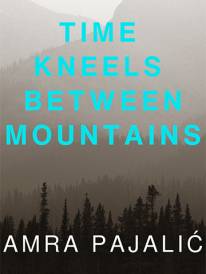Turquoise

Turquoise
Set against transcendent love, unrelenting hatred and loyalties to friends and family, Turquoise is the story of an enduring and passionate love affair between Yasmin and Renan, which spans two decades, two marriages and three continents. Yasmin and her Armenian classmate Ani were oblivious to ethnic differences during their school years in Istanbul.
Years later they run into each other, and Ani introduces Renan, her husband, to Yasmin. At that moment under the blazing autumn skies, as Yasmin locks eyes with Renan, she knows that she has come upon her destiny. But political tensions in their land soon force Renan, her secret love, and his family to immigrate to Sydney.
A few years on, Yasmin's diplomat father is appointed as the Turkish Consul General to Los Angeles where the family faces a devastating tragedy that will impact their lives in ways unfathomable. She is now forced to make a choice between passion that defines her and reason that guides her. When so much is stacked against Yasmin and Renan, how can love possibly triumph?
Ayshe Talay-Ongan is an emeritus academic and still teaches in various forums. She is the author of three textbooks in developmental psychology. She lives in Sydney with her family and Simba, her cat. Turquoise is her first novel. Its sequel, Emerald, is currently under way.
Turquoise
Author: Ayshe Talay-Ongan
ISBN: 9781921829062
Price: $24.95
Falling in love at first sight: falling is the easy part; how to stay in love…
Dr Ayshe Talay-Ongan, Psychologist and Author
Falling in love is the Holy Grail and part and parcel of marriage in Western cultures. How many times over the years have we seen images of young women (mostly) on TV and in the movies, telling their friends and family that they are in love with stars and pixie dust in their eyes? Plus, we are inundated with the expectation that when one is in love, marriage is justified; in fact, we fall in love and we get married, right? Well, obviously something is amiss in this scenario - just look at the divorce rates!
Firstly, this notion of falling in love and uniting lives based on romantic love is a relatively new one. Throughout history, if we look at how marriages took place, we see that they were mostly arranged unions, propelled by status, monetary benefit or similar advantage to the families of the future partners. Marriage then was a logical, sensible, strategic partnership. A maiden's heart may still have fluttered at the sight of a certain dashing young man, to be sure - after all, falling in love is the essence of our humanity - but marriage because of falling in love? Very rare and quite unlikely.
So firstly we, as contemporary Western women, should count our blessings for not being forced into unions that we may have loathed. Let us stop and consider that in many cultures around the globe, women are still seen as a commodity to be used and abused. That for women, pursuit of happiness is not a right, but a fantasy.
Secondly, let us take a closer look at falling in love. Think about the very first boy who took your breath away; that kid that you just could not stop thinking about….was that falling in love? And how many times has that happened to us since? Here's my point: We probably fall in love quite a few times, and it starts from our childhood! As we mature, our criteria for "marriage material" men also evolve and change. We may think that a chap is hot, even take him to bed, but few women would stake their lives on looks or sex alone.
So then, to the point. Is it possible to fall in love on first sight? The answer is, yes, but even such a 'thunderbolt' could not be sustained unless a woman's intuition, topped with her increasing knowledge of the character of that person, were at play. Women value intimacy and connectedness more than their male counterparts. Men talk sports, conquests and cars; women talk relationships, children and feelings. When women sense a certain depth of character, feelings of compassion and empathy, and genuineness in the person they were swept away by, they start paying attention to that relationship, and begin nurturing it. So love at first sight may slowly evolve into a relationship.
Some women whose self-esteem is damaged by early experiences may be trapped into seeking and sustaining relationships with men who repeat those early hurtful patterns. So instead of looking for qualities that value and honour them for who they are, they may be drawn to relationships that demean and take away from them - yet they can't get away. Such relationships are toxic addictions. Sustained punishment is not love. The female wisdom usually prompts those of us who are in such relationships to seek help. At any rate, the topic of toxic relationships is a deep and important one. We may give it the attention it deserves at a later time.
Falling in love with the worthy other is like being entrusted with the rarest, most beautiful orchid. It needs deepening knowledge of one another to sustain it. It needs growing, compassionate and empathic friendship to walk in each other's shoes to support it. It needs mutual freedom and respect to breathe in so it can flourish. It needs not just one day, one week, one month, but years to mellow and gain depth of flavour which makes the happiness it generates essential to the couple's existence - indeed like good wine or ripened cheese that is a feast for the palate. It cannot be taken for granted, because it will wilt away. And a sad dry twig is no orchid.
Remaining in love is hard work that comes easy if it's the real thing. If anything that's worth doing is worth doing well, then loving well is worth the world.
Brave New World: Starting afresh in a new country
Dr Ayshe Talay-Ongan, Psychologist and Author
Way before globalisation was a buzzword, folks have looked to distant shores for a better life. Our fair land has also had its fair share of welcoming immigrants, and it has most certainly been enriched culturally, gastronomically, and economically, to name a few areas, by many people of distant lands. In fact, Wikipedia states that last year in Australia, nearly 6,000,000 people - that is nearly one in every three of us - was born overseas!
I am proud to be one of them.
In my lifetime I have lived in Ankara, Istanbul, New York City, San Francisco, Paris and Florence, but I wouldn't trade my 23 years in Sydney to any one of them. I am a happy immigrant; yet many who have left their homelands suffer a sense of deep alienation, estrangement, and yes, even the infamous 'p' word, prejudice.
How can this be in our fair dinkum lucky country?
It happens, because we as human beings are burdened by a mechanism that is almost genetically coded in our biological make-up: we fear things, events, and people that are different than what we have been accustomed to. In the face of the little known and strange, our first survival response is to seek security in the familiar. Such fear and avoidance are, in fact, a survival mechanism we've inherited to be safe from harm. Fear, fight and flight are basic mechanisms that our body is primed to activate when we feel threatened. But to fear and snarl at another fellow human being or another community? We can do better than that.
We may have the fear, but we as civil citizens of a modern society also have the benefits education, culture and common goals for us all. Our initial reaction to meeting folks from different lands can now be processed by our evolved and educated brains to open our minds and hearts to the immigrants. After all, altruism and love mark our humanity.
Yes, yes, all true, but I also feel there are ways of making such acceptance and empathy for the new Australians easier for Australians born and bred here.
I feel that immigration to a foreign land which brings individuals and families a hope for a better life also carries with it, a degree responsibility on the part of the folks who have immigrated as well.
I believe that everyone who has made a life for herself / himself or their family in their newly adopted land must, absolutely must, acquire the language of the country they've immigrated to, and embrace the core values of the land. And take advantage of the rich educational opportunities that a public education, flaws and all, provides. And participate in public, political, employment and social life - in work and play; as colleagues and mates; as friends and neighbours. I see these attempts at approaching the 'dominant culture' as acts of thanks with a bunch of flowers for the invitation that the host county has extended to the immigrant.
Most of us who have immigrated to this land have not been invited to come here, but have had our petitions for immigration to this land of plenty approved. There are millions like us living in the conditions we've left behind.
To show that we are not as different as we are the same.
MORE



